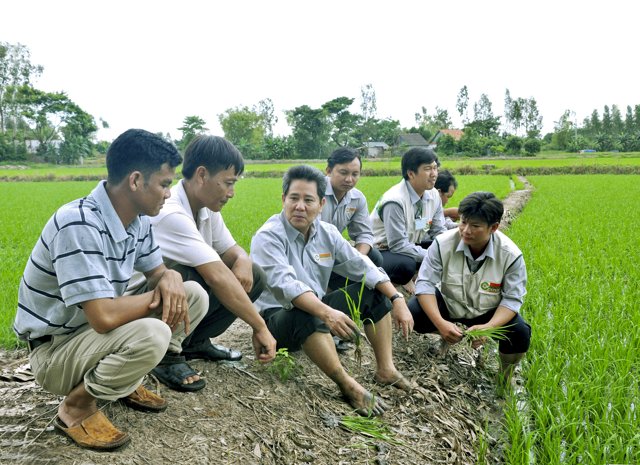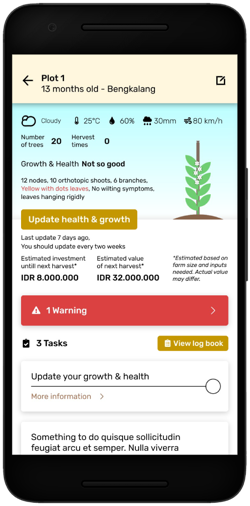Dutch water management, driver of global food security
Water management is one of the most significant challenges in the agri-food sector today. Due to population growth, industrialization, urbanization, and climate change, competition for water resources is expected to increase, with a particular negative impact on agriculture. On average, agriculture accounts for 70 percent of global freshwater withdrawals making it the largest water user worldwide. Living below sea level made the Dutch experts in dealing with water-related challenges and makes them a global partner for providing innovative solutions. Experience from the Dutch water and agriculture sectors can be instrumental in boosting global food security by increasing crop yields in regions with unreliable water supplies. The Geodata for Agriculture and Water (G4AW) Programme is supporting public and private partnerships to boost climate resilience of smallholder food producers in developing countries, using satellite data. Improved water management is one of its priorities. Dutch Water Management & IT Company Nelen & Schuurmans, is involved in several G4AW partnerships in Bangladesh, Cambodia, Indonesia and Vietnam. On World Water Day we asked Alexander Hoff, Business Manager Integrated Water Management what challenges the farmers face when managing their water resources and how to resolve them.

Neelen & Schuurmans is supporting rice producers in Vietnam to maintain sustainable production
Alexander Hoff: ‘’Drought causes food shortages and disruption of entire communities every year. But in several regions, this is in painful contrast to problems caused by floods. A well-known example is the Mekong Delta in Vietnam. What is often forgotten is that good water management is also important for other agricultural processes, such as retention of nutrients and effective application of plant protection products’’. Hoff points out that Nelen & Schuurmans’ motto is: Water management is information management. “The better we know the condition of the water system and the physical environment, the better decisions we can make in water management, both on macro and micro scale. The application of state-of-the-art IT innovations is a logical consequence of this basic idea”. The Netherlands is one of the world’s leaders in this field, emphasises Hoff, and observations from satellite images play an essential role.
According to Hoff, satellite data provides consistent information over large areas, such as the Mekong delta. “We integrate these data with measurements, field observations and various geodata sources. This serves as a basis for developing information services, such as daily irrigation advice tailored to the circumstances of a specific field. We then bring this advice to the farmers via smartphone apps, supported by clear images and explanations in the local language and our partners’ support. This advice is based on decades of experience with hydrological and crop growth models combined with (satellite) data’’.

The G4AW SpiceUp project provides geo information to support 100.000 Indonesian pepper farmers
In Indonesia, Nelen & Schuurmans is part of the SpiceUp consortium, which provides information services to 100,000 pepper farmers under the leadership of the Dutch company Verstegen Spices & Sauces, supported by G4AW. The services help farmers increase their production, income, food security and optimize inputs of water, fertilizer and plant protection products. ‘With regard to water use, the pepper is a sensitive plant; damage is easily caused by both drought and saturated conditions. In addition, pepper plants grow next to other vegetation, such as trees that provide shade. This makes it more challenging to provide reliable advice based on satellite data. Fortunately, the techniques have evolved greatly since we started in Vietnam in 2014. It's incredible how quickly the ICT technologies behind satellite data, sensors and models continue to evolve,” says Hoff.
Speaking about opportunities in the future for the use of satellite data and ICT technology for a more efficient use of water in agriculture, Hoff mentions how the Netherlands is leading the way in innovations in ICT technology and the use of satellite data for water, and therefore has the potential to become the 'Silicon Valley' of the water sector. He explains that smartphone use has become common among smallholders in Asia, while most of them have never owned a computer or laptop. As a result, they too, can benefit from high-quality information services for water and agriculture.
As to how we can ensure that more smallholder farmers can benefit from this knowledge and technology Hoff says, “therein lies a role for the Dutch technology companies that can deliver this. At the same time this requires a new way of thinking from development programs and donors to embrace both ICT technologies and the companies that developed these. The G4AW programme of the Netherlands Space Office (NSO) has pioneered the use of ICT as an objective in this domain. It is now up to the rest of the development agenda to adopt this and reap the benefits”.
________________________________________________________________________________
On 22 March 2021, the #WorldWaterDay celebrates water and raises awareness of the global water crisis, and a core focus of the observance is to support the achievement of Sustainable Development Goal (SDG) 6: water for all by 2030. In the last 30 years, food production has increased by more than 100 percent. FAO estimates that about 60 percent more food will be needed by 2050 to meet the food requirements of a growing global population. Water demand is therefore set to increase. Agriculture has a major role to play in the sustainable management of natural resources and the adaptation to, and mitigation of climate change which is already affecting the livelihoods of many people, especially the most vulnerable.